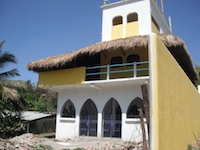Buying Land in the Punta
All land in the Punta, belongs to the county of Santa Maria Colotepec and is communal (i.e. not private). This means that all land transfers (there are no "sales" per se) are registered with the Bienes Comunales of Colotepec which issues the "acta de posesión" establishing a person’s right to use a property. The acta is similar to a deed or title (escritura pública) except that the property is not registered at the federal land office in Pochutla as private property would be.
Article 27 of the Mexican Constitution prohibits foreigners from owning property within 50 kms. of the coast, but foreigners may possess property in the restricted zone through a bank trust (fideicomiso), as long as it is titled property. In other words, a foreigner cannot get a fideicomiso on communal land, and an acta de posesión cannot be in a foreigner’s name.
It is also totally illegal to attempt to circumvent the constitution by buying property in the restricted zone by putting it in the name of a Mexican national. A "prestanombre" (name lender) is someone who, usually for a fee, will help a person get around the law. (Think of the bum in front of a liquor store who will, for a few dollars, buy liquor for a teenager, and you have a picture of the legal status of the prestanombre and his client.) For that reason a private (not registered) escritura is also not an option since it is unenforceable. (You can’t present a contract for an illegal transaction to a judge.)
On the other hand, there is no law that says a Mexican can’t get an acta de posesión and then rent the property to a foreigner. Let’s say that you, as a foreigner, have a dear Mexican friend or relative who is willing to help you out and let you buy a property in his name. You build a house and everything is fine, until your friend unexpectedly dies and his heirs now own your house. Yes it can and does sometimes happen that the widow or the children claim your property and there is nothing you can do about it. Same goes with a divorce if the couple was married under the joint property law. (See Marriage, Mexican Style in ¡Viva Puerto! #3.)
Sometimes a cash settlement can be worked out with the heirs, but not always. Or take the case of a Canadian who bought a property with the help of a prestanombres and then built a house. The Canadian died and his heirs wanted to sell the house. The prestanombres first refused to help with the sale, saying that the property was his. He finally settled for a 200,000-peso payment (almost $20,000 U.S.) to transfer the acta. Then he offered the new owner his services as prestanombre! Still, most foreigners on the Oaxaca coast, outside of Huatulco and the expropriated zone of Puerto – like Bacocho and Carrizalillo – have a prestanombre.
So what are the alternatives? Legally, there is only one and that is to form a Mexican corporation. It only takes two people to form a corporation and they can both be foreigners. A Mexican corporation has all the rights of a Mexican national. The catch is that the corporation must be lucrative and it must be administered by a certified Mexican accountant who is responsible for seeing that the taxes are paid. So now your house is a bed and breakfast and you and your guests pay rent to the corporation. It can cost you $1,200 U.S. a year in taxes and fees, but do you really want to build a $200,000 house on someone else’s property?
Or you can become a Mexican citizen. The laws keep changing, but it is something worth looking into.
All properties in Colotepec have actas de posesión, but some also have escrituras issued in Pochutla. Escrituras are good for getting fideicomisos, and fideicomisos are useful documents to present to immigration, but a fideicomiso doesn’t prove your right to use a property and is useless when you want to sell the property. Buying a property without getting the acta is like buying a car without getting the ownership papers.
A funny, not so funny story: a Mexican woman bought a property near Zicatela. She had an acta de posesión that indicated the lot number. Several times a year she would come from Oaxaca to have the property cleared. Then one day she decided to build a house. Very quickly someone else came with an acta with a different lot number to claim the property. It turned out that all these years the woman from Oaxaca had been clearing the lot next to the one she actually owned. (The real owner had also been clearing the lot, but at different times.) Meanwhile, someone else had built a house on the woman’s real lot and had gotten an acta for it. The woman was not able to regain her land, even though her acta was older, because under Mexican law anyone (who is Mexican) who occupies a property for five years, without the owner claiming it, is entitled to the property.
There was a time when unscrupulous people connected to the Bienes Comunales of Colotepec were free and easy with the issuing of actas. Record keeping was also sloppy. People now are still living with the consequences of there being two or more actas for a single property. The Bienes Comunales has partially addressed this problem by issuing "constancias de no litigio" (statements of no litigation); property in Colotepec cannot be transferred without this document.
Your best guarantee of the legitimacy of an acta in the Punta is to contract for the services of Vicki Cole of Zicatela Properties. No one else has her knowledge or her contacts in this field.















